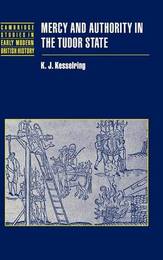
|
Mercy and Authority in the Tudor State
Hardback
Main Details
Description
Using a wide range of legal, administrative and literary sources, this study explores the role of the royal pardon in the exercise and experience of authority in Tudor England. It examines such abstract intangibles as power, legitimacy, and the state by looking at concrete life-and-death decisions of the Tudor monarchs. Drawing upon the historiographies of law and society, political culture, and state formation, mercy is used as a lens through which to examine the nature and limits of participation in the early modern polity. Contemporaries deemed mercy as both a prerogative and duty of the ruler. Public expectations of mercy imposed restraints on the sovereign's exercise of power. Yet the discretionary uses of punishment and mercy worked in tandem to mediate social relations of power in ways that most often favoured the growth of the state.
Author Biography
K. J. Kesselring is Assistant Professor of History, Dalhousie University, Nova Scotia.
Reviews'The bibliography on the Tudor dynasty is one of great length. It is one of such proportions that one could be forgiven for thinking that there was little more to say on the matter, this book proves that this assumption is far from correct. this major piece of research deserves an honoured place amongst Tudor historiography.' Open History 'This book has ... brought the study of legal history into the mainstream of Tudor historiography and its ongoing debate over the formation of the state ... truly wonderful material that should quickly find its way into every textbook and undergraduate lecture course.' H-Albion '... perceptive and well-written ... tightly focused ... carefully nuanced ...' Journal of Ecclesiastical History '... Kesselring revealingly adds a dimension to justice and order everywhere. It is besides a valuable point of reference for Tudor legal and administrative procedures.' Southern History Society '... an excellent book well written.' Sixteenth Century Journal '... this is an important and well-crafted study, written in a lively style, which repays careful reading. It offers many new insights and its findings also have significant implications for the wider discussion concerning crime and public order in seventeenth and eighteenth-century England.' Sehepunkte
|